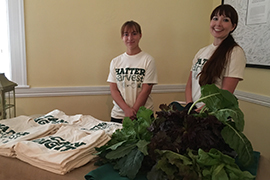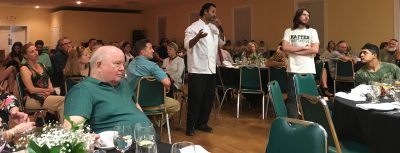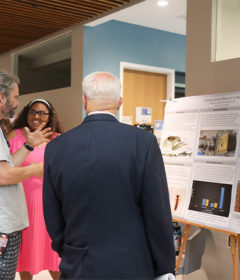Hatter Harvest Dinner Raises Awareness of Farmworker Conditions

Do you know where your food comes from?
For Hari Pulapaka, chef-owner of the Cress Restaurant in DeLand and Stetson associate math professor, the question involves far more than where the food was grown.

“I think the question implies, ‘Do you understand all that it takes to produce it in this country?’ That’s the larger question,” said Pulapaka, who helped prepare a five-course dinner Wednesday night, April 5, to raise money for the student food-awareness group, Hatter Harvest.
About 70 people attended the dinner in the Stetson Room of the Carlton Union Building. During the meal, they watched the 2014 documentary, “Food Chains,” which exposes the harsh working conditions for farmworkers, especially those who pick tomatoes in Immokalee, Florida.
The movie unfolds as the Coalition of Immokalee Workers tries to persuade Publix Super Markets to raise the price of tomatoes by 1 penny a pound to improve the pay of farmworkers. But Publix company officials refuse to meet with the farmworkers during a hunger strike outside their corporate office in Lakeland.
Stetson junior Sarah Coffey, former president of Hatter Harvest and an Environmental Sustainability Fellow, said the group organized the fundraising dinner to improve its organic garden behind the Gillespie Museum. The event also raised awareness about “problems in our food system” and the need for sustainable agriculture.

“First and foremost, this is to raise money for Hatter Harvest so we can do more for our garden like get a greenhouse and hydroponic technology, and also to increase awareness of problems in our food system,” said Coffey, one of 10 students in Hatter Harvest who helped served dinner Wednesday night. “Hatter Harvest is about teaching colleges students to grow their own food, but it’s also — more importantly — to spread the word about our food system and how we can work to change it. We have the power to do that.”
A panel discussion followed the movie with Marcos Crisanto, community organizer for the Farmworker Association of Florida; Pamela Cappas-Toro, Ph.D., Stetson assistant professor of world languages and cultures; and Robert Sitler, Ph.D., Stetson professor and director of Latin American Studies Program.
Through a translator, Crisanto told the audience: “Something that’s been really tough for our families in the last few years has been immigration policies and that makes it very difficult not just in the fields, but because people are scared to live their lives. That’s affected everyone very negatively and people live in a lot to fear.”
According to the “Food Chains” website, the documentary exposes how Florida farmworkers take on a $4 trillion global supermarket industry with their Fair Food Program, which ensures “humane wages and working conditions” for farmworkers. Stetson Dining Services is a partner in the Fair Food Program, and many other companies – from Walmart to Taco Bell – have signed on, as well.
The dinner featured five courses prepared by award-winning Cress restaurant Chef Pulapaka, Ph.D., who is the new faculty advisor for Hatter Harvest, and by Stetson Dining Executive Chef Patrick Smallen. The courses included Vichyssoise; roasted beet salad with toasted pecans and whipped goat cheese; herb-crusted red snapper; and braised short ribs; and featured many locally sourced ingredients, including goat cheese, gallberry honey, strawberries, carrots, beets and red snapper caught by hook and line off Destin, Florida. Tickets were $50 each, and 100 percent of the proceeds benefit Hatter Harvest.
-Cory Lancaster



